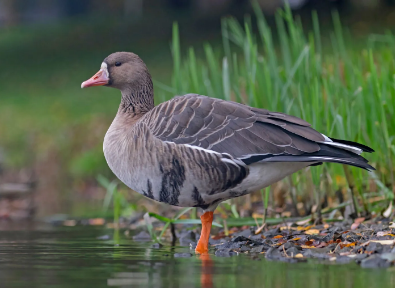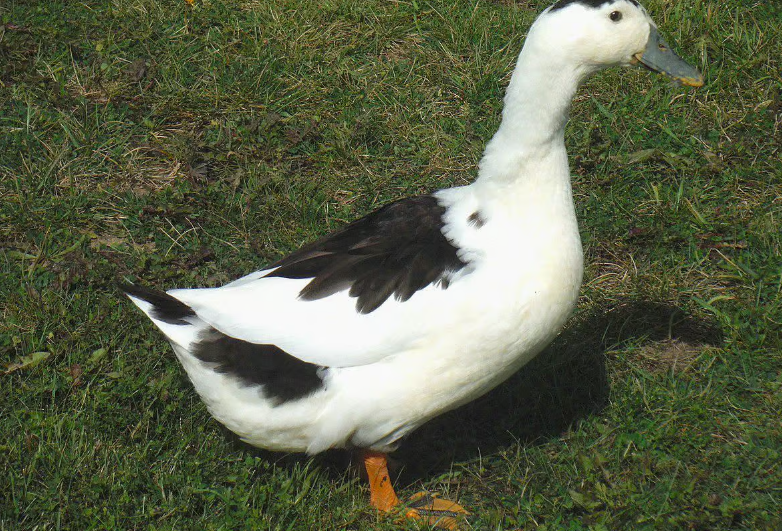Duck and goose are types of waterfowl that belong to the family Anatidae. There are 29 species of goose and around 90 species of duck that can be found all over the world.
Geese are are well-known for their distinctive honking sound, which is produced by their strong vocal cords. Geese are social animals that often mate for life and form close family bonds. They are also known for their strong sense of loyalty and protective instincts towards their young. Geese are herbivores and feed primarily on grasses and grains, although they will also eat insects and small aquatic animals. They are found all over the world and are often kept as domesticated animals for their meat, eggs, and feathers.

Ducks are smaller than geese and are known for their distinctive webbed feet and flat, broad bills, which are adapted for swimming and foraging in water. Like geese, ducks are social animals that form close family bonds and mate for life. They are also known for their beautiful plumage and for their ability to migrate over long distances. Ducks are omnivores and feed on a variety of plant and animal materials, including seeds, grasses, insects, and small fish. They are found all over the world and are often kept as domesticated animals for their meat, eggs, and feathers.

When it comes to behavior and physical characteristics, there are some key differences between geese and ducks. Geese are generally larger than ducks and have longer necks and wingspans. They are also more aggressive and territorial, particularly during breeding season. Ducks, on the other hand, are more agile in the water and are better adapted for diving and swimming. They are also more social than geese and will often form large flocks during migration. Both geese and ducks are fascinating and beautiful animals that have captured the imagination of people all over the world.
Duck vs Goose In Tabular Form
| Duck | Goose |
|---|---|
| Ducks are medium sized aquatic birds, smaller than geese. | Geese are medium to large sized aquatic birds, generally larger than ducks. |
| Male ducks have bright plumages. | Geese lack bright plumage. |
| They have a stout body with short legs. | They have a longer neck, elongated body and longer legs as compared to ducks. |
| Some domesticated ducks can lay up to an astounding 340 annually depending on their breed and environment. | Most domesticated geese can only lay up to 50 eggs each year. |
| There are around 90 species of ducks all over the world. | There are around 29 species of Geese all over the world. |
| Most of the species of ducks have orange, green, yellow or black feathers. | Most of the species of geese are grey, white or black colored and often have spots on the body. |
| Ducks use quacking noises to communicate with one another. | Geese using a distinctive honking vocalization to communicate with other geese. |
| Ducks are omnivores, meaning they eat plants as well as fish and other invertebrate animals as needed. | Geese are considered to be herbivores, sticking only to plants and foliage unless in dire circumstances. |
Other ways tell if a bird is a goose or a duck.
- Geese are generally larger than ducks. They have longer neck, more elongated body and longer legs compared to ducks. Ducks are usually smaller. They have stout body with short legs.
- Geese tend to be grey, white and/or black with little to no additional coloring.
- A goose’s eggs are larger and they tend to lay less frequently than ducks.
- Ducks only have 16 or even less vertebrae that make up their necks while geese can have up to 23 neck vertebrae.
- Geese have longer life spans than ducks overall, living an average of 8 to 12 years, while ducks live an average of 3 to 8 years total.
- Ducks have broad, flat bill with high-positioned nostrils. Geese have shorter, notched bill and low-positioned nostrils.
- Feet of both geese and ducks are webbed (designed to facilitate swimming). Webbing on the feet of geese are more prominent than those on the feet of ducks.
- Ducks are often portrayed in cartoons. The best known cartoon ducks are Daffy Duck and Donald Duck. Geese are often mentioned in the stories, such as a story of goose that lays golden eggs.